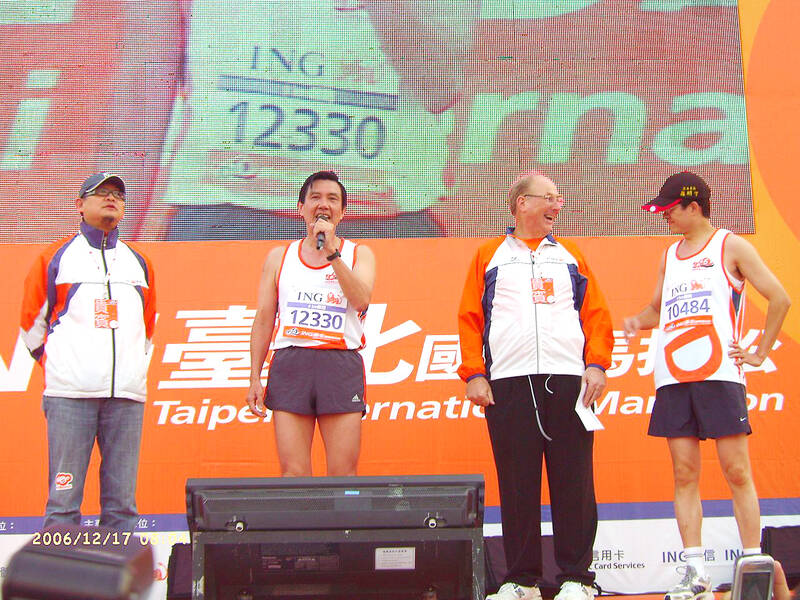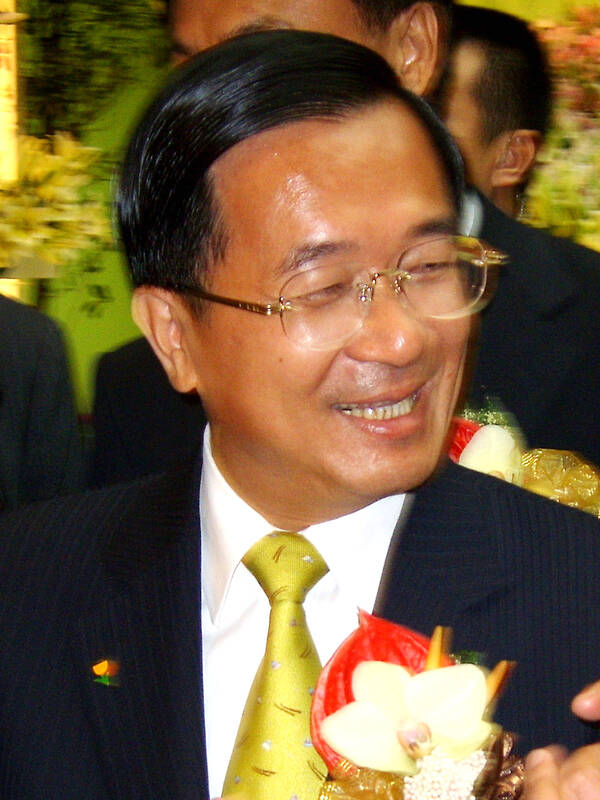On the evening of June 1, Control Yuan Secretary-General Lee Chun-yi (李俊俋) apologized and resigned in disgrace.
His crime was instructing his driver to use a Control Yuan vehicle to transport his dog to a pet grooming salon.
The Control Yuan is the government branch that investigates, audits and impeaches government officials for, among other things, misuse of government funds, so his misuse of a government vehicle was highly inappropriate.

Photo courtesy of Wikimedia Commons
If this story were told to anyone living in the golden era of swaggering gangsters, flashy nouveau riche businessmen, and corrupt “black gold” politics of the 1980s and 1990s, they would have laughed. It was simply inconceivable.
That era was detailed in the April 22 edition of this column, “Taiwan’s swaggering culture and the erection of Taipei 101.”
It was a time when money, power, corruption and crime ruled. Chinese Nationalist Party (KMT) politicians, high-ranking government officials, police and gangsters were all intertwined and businesses could get away with anything for the right price.

Photo courtesy of Wikimedia Commons
Young toughs with big gangster dreams roamed menacingly through the streets in gaudy clothes and terrorized motorists on racing-style motorcycles. The appropriate response to seeing gangsters beating up someone was to look away and make a hasty exit.
Police and government officials did not care about extortion or gang violence as long as it did not get too out of control. When it did, they would squeeze their nightlife business cash cows and threaten their brothels to bring them back in line.
Vote-buying was brazenly open. Toxic chemical runoff, large-scale air pollution and dangerous workplace environments were illegal but greasing palms made anything possible. The economy boomed, but the health costs were enormous.
Even the smallest shop owners had to pay protection money to both police and gangsters.
Today, corruption is low-key and not a common feature of the average person’s life. Shopkeepers are unmolested and factories now either follow regulations, or go to extreme secretive lengths to get around them.
Large-scale corruption still exists in major development and property projects, but the paper trails are very carefully constructed to avoid detection. Smarter operators use overseas subsidiaries to pay kickbacks into official’s overseas bank accounts, making it very hard to track.
Today, the most common corruption cases reaching prosecution involve pilfering by lawmakers of funds to pay assistants, and in rigging solar energy projects.
Gang violence is rare and gangsters are far less visible. Taipei is no longer the sex tourism paradise it once was, and police take crime far more seriously.
Taiwan ranks as one of the safest countries in the world today. Transparency International’s Corruption Perceptions Index ranks Taiwan at 25th, tied with France and ahead of the US, but just behind Japan.
Why did Taiwan improve so dramatically? The reasons are varied, with some improvements made through hard work, and others by changing circumstances.
DEMOCRACY AND FREE PRESS
The transition to democracy in the 1990s played a significant role.
The KMT no longer had a monopoly on power, and an increasingly free press exposed corruption and crime that had previously been hushed up.
In the early days, the fledgling Democratic Progressive Party (DPP) presented themselves as a clean alternative to the KMT’s “black gold” politics, and began to win on the issue.
Some DPP politicians started to have some success. To get around corrupt police and officials future president and then Taipei mayor Chen Shui-bian (陳水扁) cut water and power supplies to businesses suspected of illicit activities, such as prostitution.
This put pressure on the KMT to clean up the party’s image. Another future president, then justice minister Ma Ying-jeou (馬英九), led a crusade against corrupt local politicians — mostly from the KMT’s own local political factions — until he was removed from office following intense pressure within the party.
Out-of-control crime and corruption were top issues for voters during that era, and effective anti-corruption politicians were rewarded by voters.
This was actively seized on by the press, and no longer able to order them around, formerly authoritarian-era KMT politicians had to learn how to respond.
When big stories broke about corruption and crime, politicians of all parties learned they had to take action to remain viable. This increased the pressure to appoint prosecutors and police willing to take action.
RISE IN ANONYMITY
Anonymity is often overlooked as a factor.
Increasing urbanization meant that in cities, old-school patronage politics and gangster ties lost influence over voters as there were too many to reach effectively. As many workers individually moved to the cities, their old family, clan, and political ties became less relevant, making it hard to influence people in groups.
So local patronage factions lost ground and have largely disappeared in the cities, though they are still active in more rural areas where temples and clan ties are still powerful.
Anonymous tip lines were also used to crack down on gangsters and corruption, allowing people to report criminal activity without fear of retribution. By law, every report had to be investigated, and even corrupt cops could not snitch on informers whose identity was a mystery.
Today, anonymous tip lines are mostly known for being a useful harassment tool by grumpy neighbors, people out for revenge and to undermine competing businesses — but they were once a tool in taking on powerful and dangerous figures.
DIMINISHING RETURNS
As the crackdowns intensified, the risk versus reward calculus changed. Once largely risk-free, much corruption became dangerous.
Fear of the newly energized press, the anonymous tip lines and politicians and officials with their jobs on the line putting pressure from above, cracks in the entire system began to appear.
It was no longer worthwhile to extort protection money from every little business. Corrupt officials faced risk every time they demanded a bribe.
Victims could report them to the police anonymously, quietly to a sympathetic clean politician or publicly to the press.
The system had to stop harassing regular people, and shift to more behind-the-scenes tactics. Today, most corruption is collusion and fraud-based, hidden behind lawyers, accountants and secret deals aided by officials on a nod and a wink basis so it becomes hard to prove.
By the late 1990s and into the early 2000s, the boom economic times were coming to an end. The seemingly endless cash sloshing around began to dry up as people became more prudent with their spending and investments. The go-go party times were coming to an end, making many corrupt sources of revenue shrink.
TAIWAN AS CRIME EXPORTER
Simultaneously, China and parts of Southeast Asia were becoming the new Wild West.
Entrepreneurs took advantage of cheap labor and moved their heavily polluting, dangerous business operations to these more corruption-friendly environments. They took their swaggering, hard-drinking, wild partying and whoring culture with them.
The gangsters followed. Even today, Taiwanese gangsters involved in smuggling, human trafficking and scam operations are legendary throughout the region, if no longer at home.
Much of Taiwan’s middle class followed, attracted by booming business opportunities. This was especially true of young and adventurous males.
Staying behind were their parents, the poor and often the wives and children of those seeking their fortunes abroad.
Taiwan’s society became increasingly prim and proper, safer and far less tolerant of the excesses of the “black-gold” era. Exercising, healthy food, raising pets, environmentally friendly practices, clean streets and parks were in — wild drinking and partying were pushed to the margins.
This is the type of society that thinks, “How dare you order your driver to use a fancy government car to get your pet groomed!”
Demographics and international trends suggest that will remain the case for the foreseeable future.
Donovan’s Deep Dives is a regular column by Courtney Donovan Smith (石東文) who writes in-depth analysis on everything about Taiwan’s political scene and geopolitics. Donovan is also the central Taiwan correspondent at ICRT FM100 Radio News, co-publisher of Compass Magazine, co-founder Taiwan Report (report.tw) and former chair of the Taichung American Chamber of Commerce. Follow him on X: @donovan_smith.

Oct. 27 to Nov. 2 Over a breakfast of soymilk and fried dough costing less than NT$400, seven officials and engineers agreed on a NT$400 million plan — unaware that it would mark the beginning of Taiwan’s semiconductor empire. It was a cold February morning in 1974. Gathered at the unassuming shop were Economics minister Sun Yun-hsuan (孫運璿), director-general of Transportation and Communications Kao Yu-shu (高玉樹), Industrial Technology Research Institute (ITRI) president Wang Chao-chen (王兆振), Telecommunications Laboratories director Kang Pao-huang (康寶煌), Executive Yuan secretary-general Fei Hua (費驊), director-general of Telecommunications Fang Hsien-chi (方賢齊) and Radio Corporation of America (RCA) Laboratories director Pan
The consensus on the Chinese Nationalist Party (KMT) chair race is that Cheng Li-wun (鄭麗文) ran a populist, ideological back-to-basics campaign and soundly defeated former Taipei mayor Hau Lung-bin (郝龍斌), the candidate backed by the big institutional players. Cheng tapped into a wave of popular enthusiasm within the KMT, while the institutional players’ get-out-the-vote abilities fell flat, suggesting their power has weakened significantly. Yet, a closer look at the race paints a more complicated picture, raising questions about some analysts’ conclusions, including my own. TURNOUT Here is a surprising statistic: Turnout was 130,678, or 39.46 percent of the 331,145 eligible party

The classic warmth of a good old-fashioned izakaya beckons you in, all cozy nooks and dark wood finishes, as tables order a third round and waiters sling tapas-sized bites and assorted — sometimes unidentifiable — skewered meats. But there’s a romantic hush about this Ximending (西門町) hotspot, with cocktails savored, plating elegant and never rushed and daters and diners lit by candlelight and chandelier. Each chair is mismatched and the assorted tables appear to be the fanciest picks from a nearby flea market. A naked sewing mannequin stands in a dimly lit corner, adorned with antique mirrors and draped foliage

The election of Cheng Li-wun (鄭麗文) as chair of the Chinese Nationalist Party (KMT) marked a triumphant return of pride in the “Chinese” in the party name. Cheng wants Taiwanese to be proud to call themselves Chinese again. The unambiguous winner was a return to the KMT ideology that formed in the early 2000s under then chairman Lien Chan (連戰) and president Ma Ying-jeou (馬英九) put into practice as far as he could, until ultimately thwarted by hundreds of thousands of protestors thronging the streets in what became known as the Sunflower movement in 2014. Cheng is an unambiguous Chinese ethnonationalist,